新目标七年级下Review of units 1-6(35张ppt)
文档属性
| 名称 | 新目标七年级下Review of units 1-6(35张ppt) |
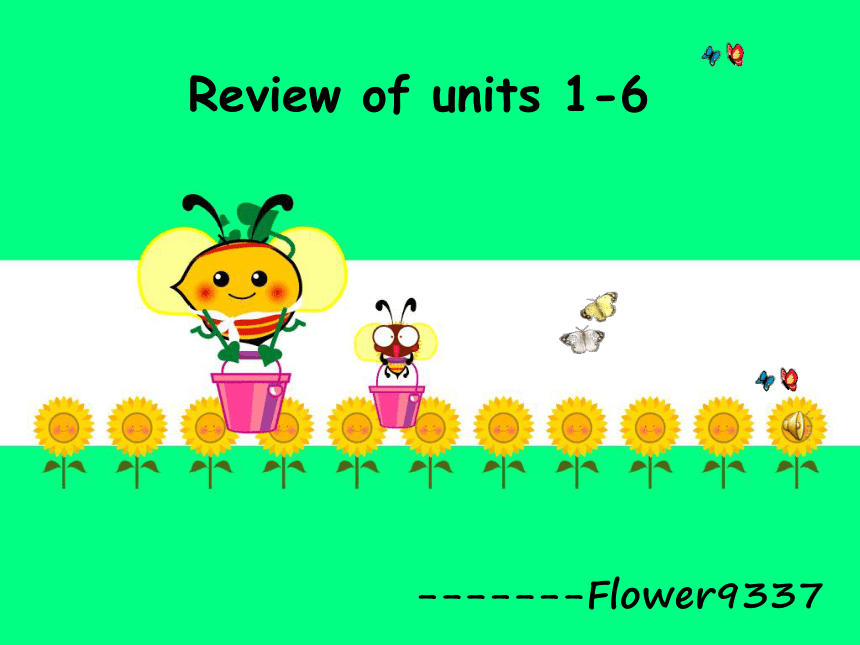
|
|
| 格式 | zip | ||
| 文件大小 | 1.6MB | ||
| 资源类型 | 教案 | ||
| 版本资源 | 人教新目标(Go for it)版 | ||
| 科目 | 英语 | ||
| 更新时间 | 2012-04-10 18:25:37 | ||
图片预览

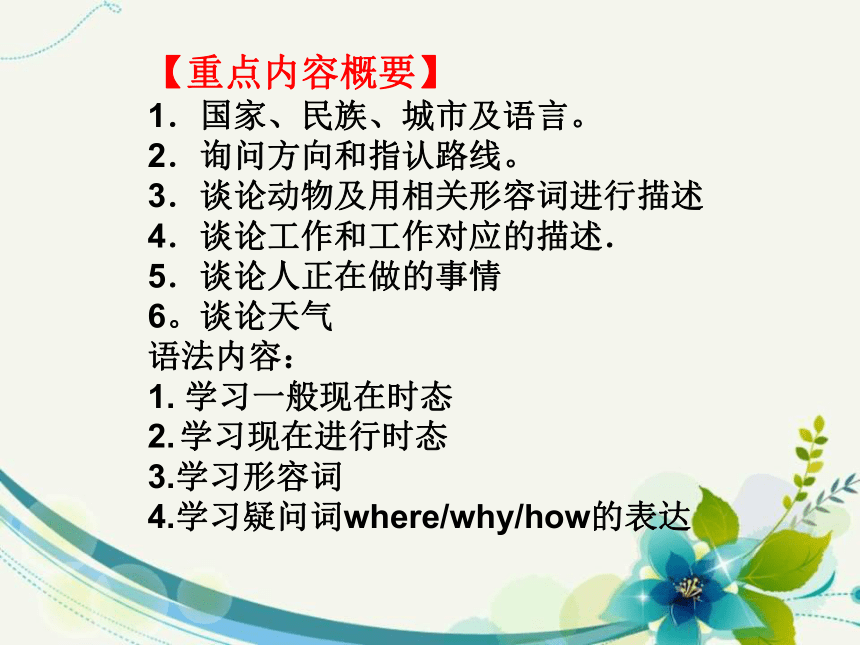
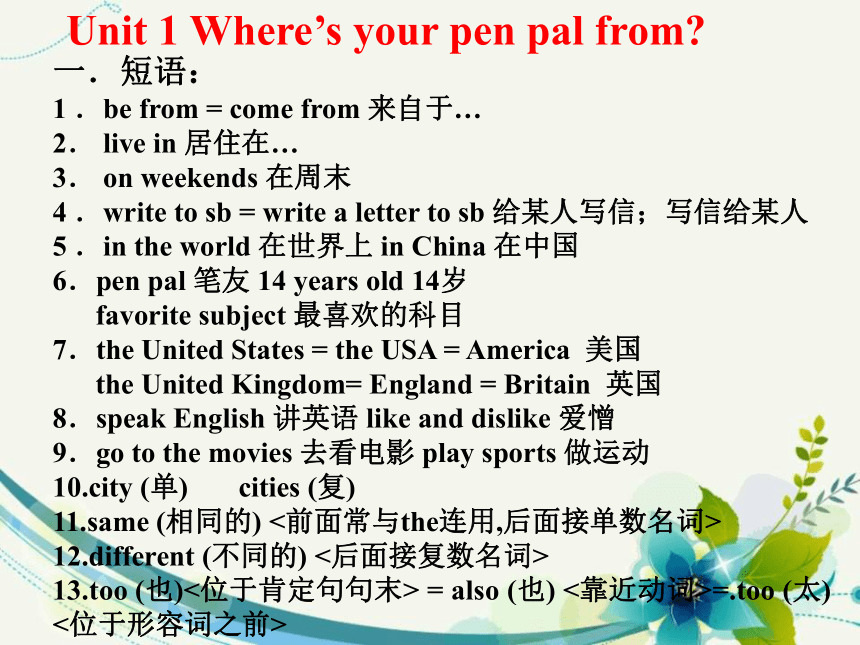

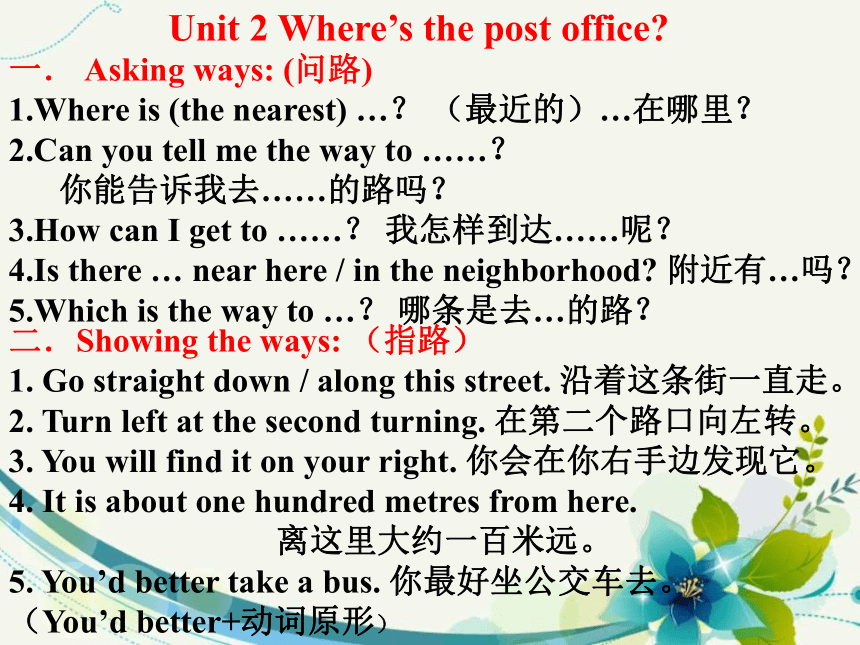
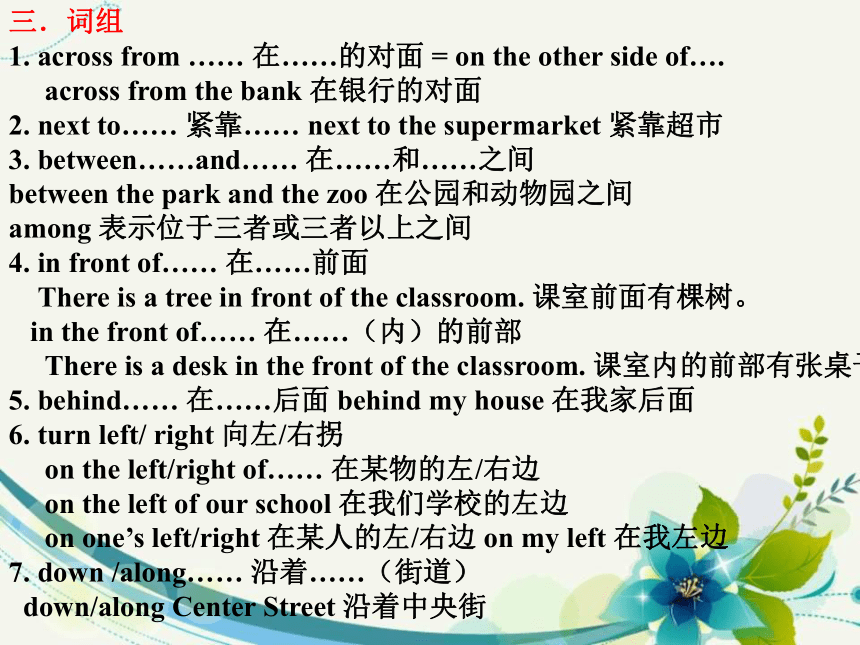
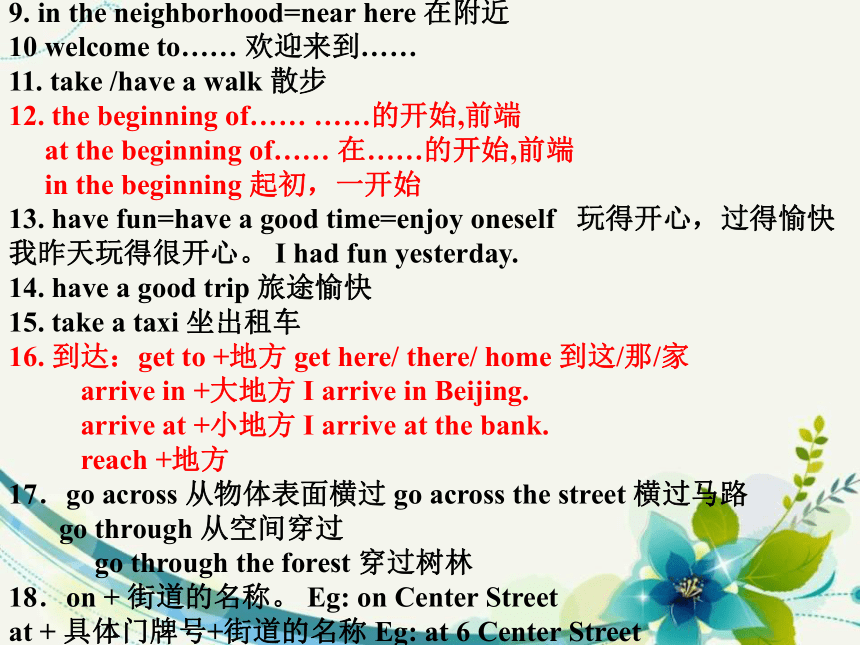
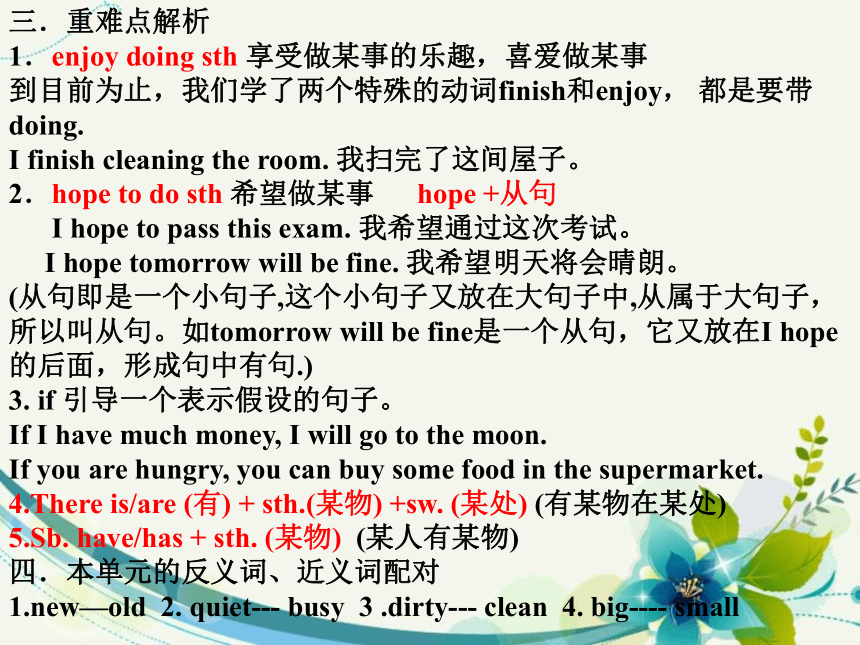
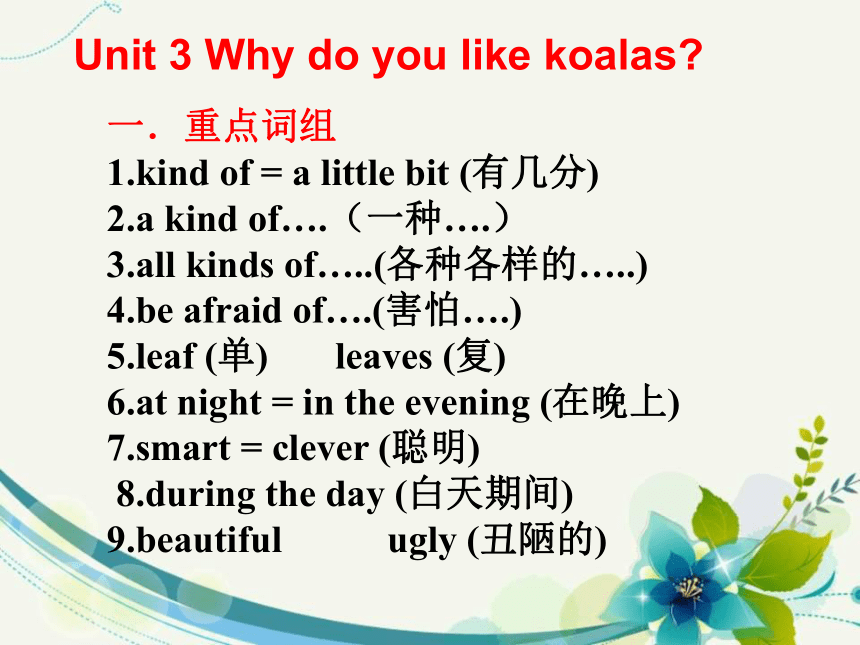
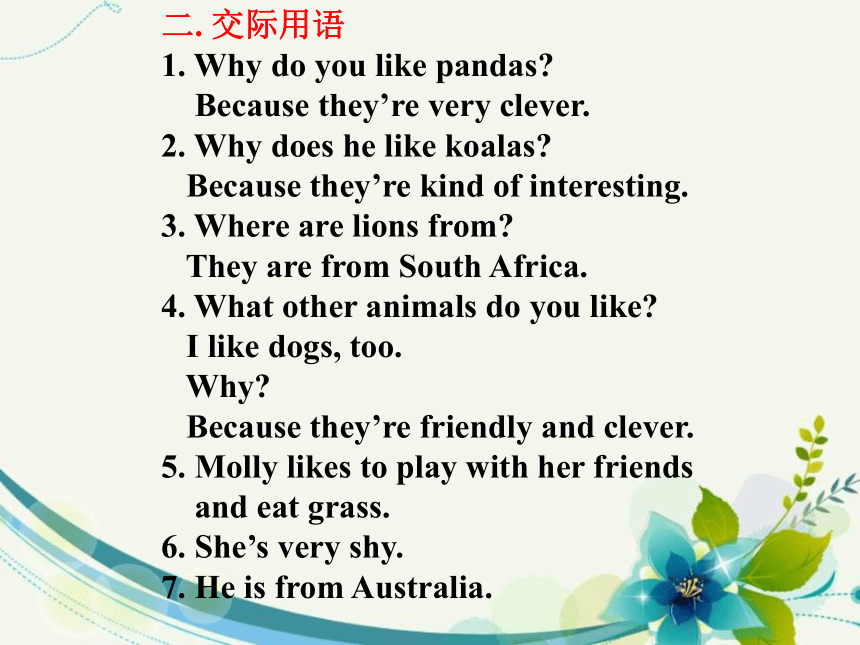
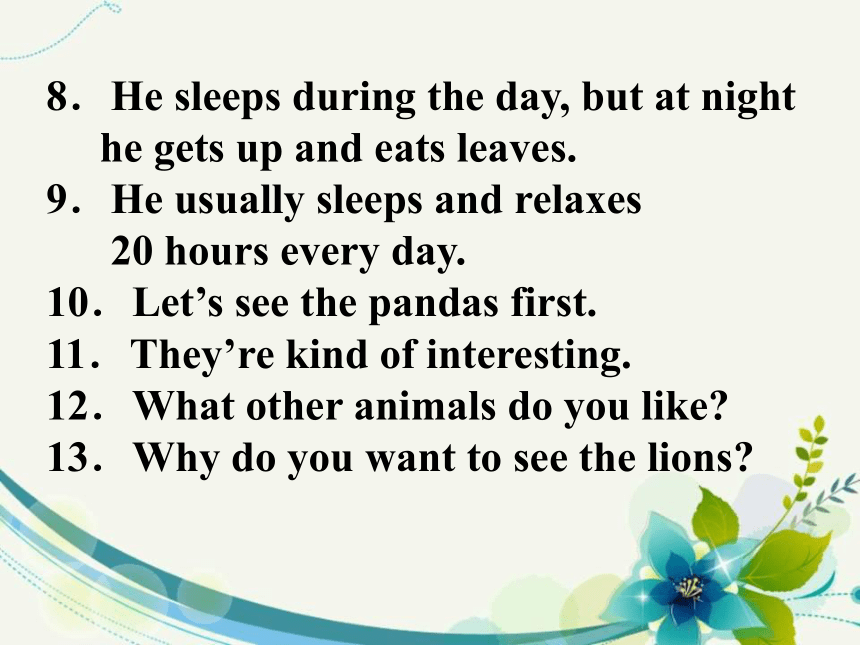
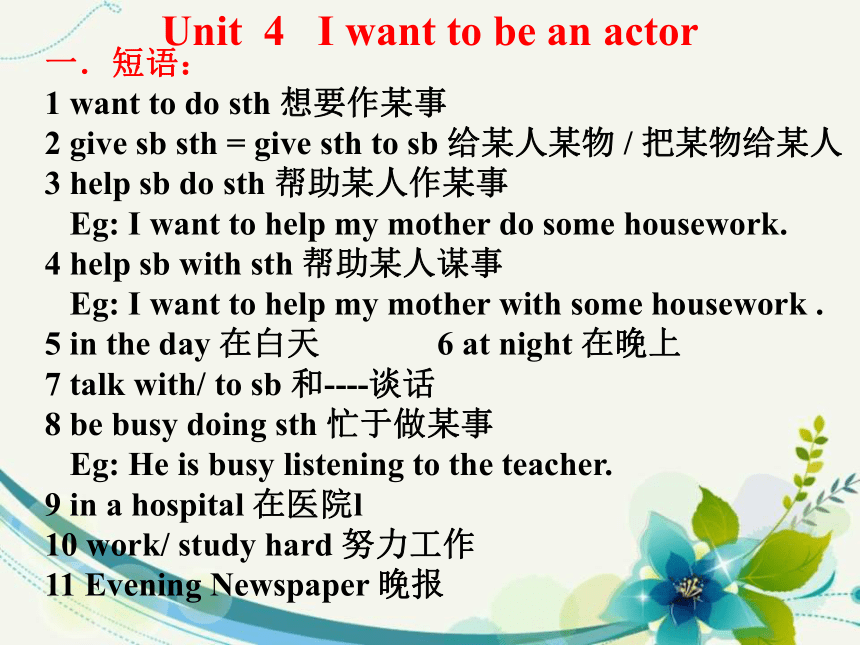
文档简介
(共36张PPT)
递铺镇中学 王玥
Review of units 1-6
-------Flower9337
【重点内容概要】
1.国家、民族、城市及语言。
2.询问方向和指认路线。
3.谈论动物及用相关形容词进行描述
4.谈论工作和工作对应的描述.
5.谈论人正在做的事情
6。谈论天气
语法内容:
1. 学习一般现在时态
学习现在进行时态
3.学习形容词
4.学习疑问词where/why/how的表达
Unit 1 Where’s your pen pal from
一.短语: 1 .be from = come from 来自于… 2. live in 居住在… 3. on weekends 在周末 4 .write to sb = write a letter to sb 给某人写信;写信给某人 5 .in the world 在世界上 in China 在中国 6.pen pal 笔友 14 years old 14岁
favorite subject 最喜欢的科目 7.the United States = the USA = America 美国
the United Kingdom= England = Britain 英国
8.speak English 讲英语 like and dislike 爱憎 9.go to the movies 去看电影 play sports 做运动 10.city (单) cities (复)
11.same (相同的) <前面常与the连用,后面接单数名词>
12.different (不同的) <后面接复数名词>
13.too (也)<位于肯定句句末> = also (也) <靠近动词>=.too (太) <位于形容词之前>
二.重点句式: 1 Where’s your pen pal from
= Where does your pen pal from 2 Where does he live 3 What language(s) does he speak 4 I want a pen pal in China. 5 I can speak English and a little French. 6 Please write and tell me about yourself. 7 Can you write to me soon 8 I like going to the movies with my friends and playing sports.
三.本单元的国家,人民、语言对应。 1 Canada---- Canadian---- English / French 2 France------ French------French 3 Japan------Japanese----Japanese 4 Australia----Australian----- English 5 the United States------ American---- English 6 the United Kingdom---British----- Enghish
Unit 2 Where’s the post office
一. Asking ways: (问路) 1.Where is (the nearest) …? (最近的)…在哪里? 2.Can you tell me the way to ……?
你能告诉我去……的路吗? 3.How can I get to ……? 我怎样到达……呢? 4.Is there … near here / in the neighborhood 附近有…吗? 5.Which is the way to …? 哪条是去…的路?
二.Showing the ways: (指路) 1. Go straight down / along this street. 沿着这条街一直走。 2. Turn left at the second turning. 在第二个路口向左转。 3. You will find it on your right. 你会在你右手边发现它。 4. It is about one hundred metres from here.
离这里大约一百米远。 5. You’d better take a bus. 你最好坐公交车去。
(You’d better+动词原形)
三.词组 1. across from …… 在……的对面 = on the other side of….
across from the bank 在银行的对面 2. next to…… 紧靠…… next to the supermarket 紧靠超市 3. between……and…… 在……和……之间 between the park and the zoo 在公园和动物园之间 among 表示位于三者或三者以上之间 4. in front of…… 在……前面
There is a tree in front of the classroom. 课室前面有棵树。 in the front of…… 在……(内)的前部
There is a desk in the front of the classroom. 课室内的前部有张桌子。 5. behind…… 在……后面 behind my house 在我家后面 6. turn left/ right 向左/右拐 on the left/right of…… 在某物的左/右边
on the left of our school 在我们学校的左边 on one’s left/right 在某人的左/右边 on my left 在我左边
7. down /along…… 沿着……(街道)
down/along Center Street 沿着中央街
9. in the neighborhood=near here 在附近 10 welcome to…… 欢迎来到…… 11. take /have a walk 散步 12. the beginning of…… ……的开始,前端
at the beginning of…… 在……的开始,前端 in the beginning 起初,一开始 13. have fun=have a good time=enjoy oneself 玩得开心,过得愉快 我昨天玩得很开心。 I had fun yesterday. 14. have a good trip 旅途愉快
15. take a taxi 坐出租车 16. 到达:get to +地方 get here/ there/ home 到这/那/家 arrive in +大地方 I arrive in Beijing. arrive at +小地方 I arrive at the bank. reach +地方 17.go across 从物体表面横过 go across the street 横过马路 go through 从空间穿过
go through the forest 穿过树林 18.on + 街道的名称。 Eg: on Center Street at + 具体门牌号+街道的名称 Eg: at 6 Center Street
三.重难点解析 1.enjoy doing sth 享受做某事的乐趣,喜爱做某事 到目前为止,我们学了两个特殊的动词finish和enjoy, 都是要带 doing. I finish cleaning the room. 我扫完了这间屋子。 2.hope to do sth 希望做某事 hope +从句
I hope to pass this exam. 我希望通过这次考试。 I hope tomorrow will be fine. 我希望明天将会晴朗。 (从句即是一个小句子,这个小句子又放在大句子中,从属于大句子,
所以叫从句。如tomorrow will be fine是一个从句,它又放在I hope 的后面,形成句中有句.) 3. if 引导一个表示假设的句子。 If I have much money, I will go to the moon.
If you are hungry, you can buy some food in the supermarket. 4.There is/are (有) + sth.(某物) +sw. (某处) (有某物在某处)
5.Sb. have/has + sth. (某物) (某人有某物)
四.本单元的反义词、近义词配对 1.new—old 2. quiet--- busy 3 .dirty--- clean 4. big---- small
Unit 3 Why do you like koalas
一.重点词组
1.kind of = a little bit (有几分)
2.a kind of….(一种….)
3.all kinds of…..(各种各样的…..)
4.be afraid of….(害怕….)
5.leaf (单) leaves (复)
6.at night = in the evening (在晚上)
7.smart = clever (聪明)
8.during the day (白天期间)
9.beautiful ugly (丑陋的)
二. 交际用语 1. Why do you like pandas
Because they’re very clever. 2. Why does he like koalas
Because they’re kind of interesting. 3. Where are lions from
They are from South Africa. 4. What other animals do you like I like dogs, too. Why Because they’re friendly and clever. 5. Molly likes to play with her friends
and eat grass. 6. She’s very shy. 7. He is from Australia.
8.He sleeps during the day, but at night
he gets up and eats leaves. 9.He usually sleeps and relaxes
20 hours every day. 10.Let’s see the pandas first. 11.They’re kind of interesting. 12.What other animals do you like 13.Why do you want to see the lions
Unit 4 I want to be an actor
一.短语: 1 want to do sth 想要作某事 2 give sb sth = give sth to sb 给某人某物 / 把某物给某人 3 help sb do sth 帮助某人作某事
Eg: I want to help my mother do some housework. 4 help sb with sth 帮助某人谋事
Eg: I want to help my mother with some housework . 5 in the day 在白天 6 at night 在晚上 7 talk with/ to sb 和----谈话 8 be busy doing sth 忙于做某事
Eg: He is busy listening to the teacher. 9 in a hospital 在医院l 10 work/ study hard 努力工作 11 Evening Newspaper 晚报
二.重点句式及注意事项: 1 询问职业的特殊疑问词是what; 有三种主要句式 ① What + is / are + sb ② What + does/ do + sb + do ③ What + is/ are + 名词所有格/ 形容词性物主代词 + job 2 People give me their money or get their money from me. 3 Sometimes I work in the day and sometimes at night. 4 I like talking to people. 5 I work late. I’m very busy when people go out to dinners. 6 Where does your sister work 7 then we have a job for you as a waiter. 8 Do you want to work for a magazine
Then come and work for us as a reporter. 9 Do you like to work evenings and weekends 10 We are an international school for children of 5-12.
Unit 5 I’m watching TV
一.现在进行时
1.现在进行时:
a.现在正在发生或进行的动作.
b.构成: 主语 + be动词 + 动词的现在分词 <缺一不可>
c.动词现在分词的构成:
<1>一般直接在词尾加“ing”;
<2>以不发音“e”结尾的,去 “e”加 “ing”;
<3>双写最后一个字母,再加 “ing”; eg: begin,get,let,
sit,put,run,drop,hit,forget,swim,stop,travel,
plan,shop;
d.现在进行时的标志词:look, listen, now, It’s + 时刻,
2.do one’s homework
= do homework (做家庭作业)
3.a.看电视/比赛用“watch”;
b.看书/报纸/杂志用“read”;
4.wait for….(等候….) 5.TV show (电视节目)
6.at school/home/work (在学校/家/工作)
7.Make telephone calls (打电话)
a.Hello,here is/it’s + 电话号码 (你好!这儿是……)
b.Hello,may/can/could I speak to……,please
(你好,我可以与……通话吗?)
c.Who’s that (speaking) (你是谁?)
d.This is…….(speaking) . (我是…..)
e.Is that…….(speaking)
/Is…….. there (你是….吗?)
Unit 6 It’s raining!
一.短语: 1 take photos/ pictures 照像 2 take photos/ pictures of sb/ sth 给某人或某物照相 3 have a good time\have fun\have a great tame 玩得愉快 4 work for sb / sth 为某人工作 Eg: Yuan Yuan works for CCTV’s Around The World show 5 on vacation 度假Eg: There are many people here on vacation. 6 some…others… 一些…另外一些….
one……the other…一个…另一个…(两者之间) 7 put on 穿上(动作) wear 穿着(状态) Eg: Tom is putting on his coat now. 8 on the beach 在沙滩上 Eg: Tom and his family are playing on the beach at this moment. 9 this group of people 这一群人 10. in this heat 在这样的高温下
天气词:
1.cloud (云) cloudy (多云的) wind (风)
windy (有风的) sun (太阳) sunny (晴朗的)
rain (雨/下雨) rainy (下雨的)
snow (雪/下雪) snowy (下雪的)
重难点解析 1 询问天气情况的句式:(横线内容可替换) ① How is the weather in Beijing
(How is the weather today ) ② What’s the weather like in Beijing
( What’s the weather like today ) 2 回答上面问题的句式: ①It’s + adj. (形容词) Eg: It’s windy. 3 How’s it going (with you) ① Not bad. ② Great! ③ Terrible! ④ Pretty good.
4.pretty (相当) = quite /very (十分)
pretty (漂亮) = beautiful
5.hot (热) cold (冷)
6.cool (凉爽) warm (暖和)
7.humid (潮湿) dry (干燥)
8.lie (躺) lying
9.Thanks for sth./doing sth. (因….而感谢)
10.on vacation (度假)
11.on the beach (在沙滩上)
12.take photos/pictures (照相)
13.a group of…(一群…) <后接复数名词>
14.beach volleyball (沙滩排球)
15.be surprised (吃惊的)
16.have a good/great/nice time
= have fun
= enjoy oneself (玩得高兴)
17.everyone (每人) someone (某人)
everything (一切) something (某物)
nobody (没有人)
<作主语时,谓语动词用第三人称单数>
18.want sb.to do sth. (想要某人做某事)
19.in order to……(为了….)
sunny
Explain the meaning of each weather symbol in English.
cloudy
windy
rainy
snowy
Task 1:
2
3
4
1
A:How is the weather B: It’s…
A:What’s she doing B: She is…
A:What do you usually do when it’s raining
B: I…
City Weather High Low
Moscow snowy 5 1
Paris rainy 10 2
New York cloudy 21 13
Hong Kong sunny 23 19
Tokyo windy 11 7
Model:
Good morning! Here’s the weather report for some big cities. Moscow is snowy. The temperature (温度)will be 1 to 5. Paris .
.
. That’s the weather report for today. Thank you for listening.
反馈练习: 1.—Excuse me ________
—It is over there, near the bus stop.
A.How do you like the cinema
B.May I ask you the way
C.Where is the Bank of China
D.How far is the market from here
【解析】考查交际用语。由答语“它在那边,靠近汽车站。”可知选C,句意为“中国银行在哪里?”
【答案】C
2.(2011·临沂)—Excuse me.Could you please tell me where I can get the dictionary
—________.There's a bookstore on Yimeng Road.
A.Sorry B.Sure
C.Good idea D.Thank you
【解析】考查口语交际。通过答语的下半句可知答语为肯定回答,用sure来回答Could you please...引导的表示委婉语气的一般疑问句。
【答案】B
3.(2011·湘西)—________?
—He is tall.
A.How is he
B.What does he look like
C.What does he like
【解析】考查特殊句式。How is he?“他健康吗?”What does he like?“他喜欢什么?”而What does he look like?才是问:“他长什么样子?”。
【答案】B
4.—Jack Jack Can you come
—I ________ my homework.
A.do B.will do
C.am doing D.was doing
【解析】考查现在进行时。答语表示正在进行的动作,用现在进行时。句意为“Jack?Jack?你能过来吗”“我正在做作业。”故选C。
【答案】C
5.(2011·安顺)—________kind girl Nancy is!
—Yes,she is always ready to help others.
A.What B.What a
C.How D.How a
【解析】考查感叹句的用法。What+a/an+形容词+名词+主语+谓语!而how引导的感叹句结构是:How+形容词/副词+主语+谓语!根据句意应该选择B。
【答案】B
6.—Do we have to finish our homework this afternoon
—Yes, you ________.
A.must B.can
C.may D.need
【解析】考查情态动词的用法。“我们今天下午必须完成家庭作业吗?”答语“是的。”根据句意选A,表示“必须”。
【答案】A
7.She is new here, so we know ________ about her.
A.nothing B.something
C.anything D.everything
【解析】考查不定代词。由句意“她是新来的,所以我们对她一无所知。”可知选A。
【答案】A
8.—Excuse me, which is the way to the post office
—Sorry, I don't know.You can ask the policeman over there.
—________
A.How lucky!
B.It's a pity.
C.Thank you all the same.
【解析】考查交际用语。根据句意“打扰了。邮局怎么走?”“对不起,我不知道。你可以问那边的警察。”可知选C,表示“仍然感谢。”
【答案】C
9.(2011·安顺)—I can't stop smoking,doctor.
—For your health,I'm afraid you ________.
A.may B.can
C.have to D.need
【解析】考查交际用语。根据句意“医生,我不能戒烟。”“为了你的健康,恐怕你不得不。”may意为“可以”;can意为“能够”;need意为“需要”均不符合句意。
【答案】C
10.(2011·佛山)Parents care about ________ children's education more than anything else.
A.their
B.them
C.theirs
【解析】考查代词的用法。名词前面用形容词性物主代词。故选A。
【答案】A
Writing
Please write something about different seasons
in your hometown and what do you usually do in
different seasons.
My Hometown
.
.
.
.
.
.
递铺镇中学 王玥
Review of units 1-6
-------Flower9337
【重点内容概要】
1.国家、民族、城市及语言。
2.询问方向和指认路线。
3.谈论动物及用相关形容词进行描述
4.谈论工作和工作对应的描述.
5.谈论人正在做的事情
6。谈论天气
语法内容:
1. 学习一般现在时态
学习现在进行时态
3.学习形容词
4.学习疑问词where/why/how的表达
Unit 1 Where’s your pen pal from
一.短语: 1 .be from = come from 来自于… 2. live in 居住在… 3. on weekends 在周末 4 .write to sb = write a letter to sb 给某人写信;写信给某人 5 .in the world 在世界上 in China 在中国 6.pen pal 笔友 14 years old 14岁
favorite subject 最喜欢的科目 7.the United States = the USA = America 美国
the United Kingdom= England = Britain 英国
8.speak English 讲英语 like and dislike 爱憎 9.go to the movies 去看电影 play sports 做运动 10.city (单) cities (复)
11.same (相同的) <前面常与the连用,后面接单数名词>
12.different (不同的) <后面接复数名词>
13.too (也)<位于肯定句句末> = also (也) <靠近动词>=.too (太) <位于形容词之前>
二.重点句式: 1 Where’s your pen pal from
= Where does your pen pal from 2 Where does he live 3 What language(s) does he speak 4 I want a pen pal in China. 5 I can speak English and a little French. 6 Please write and tell me about yourself. 7 Can you write to me soon 8 I like going to the movies with my friends and playing sports.
三.本单元的国家,人民、语言对应。 1 Canada---- Canadian---- English / French 2 France------ French------French 3 Japan------Japanese----Japanese 4 Australia----Australian----- English 5 the United States------ American---- English 6 the United Kingdom---British----- Enghish
Unit 2 Where’s the post office
一. Asking ways: (问路) 1.Where is (the nearest) …? (最近的)…在哪里? 2.Can you tell me the way to ……?
你能告诉我去……的路吗? 3.How can I get to ……? 我怎样到达……呢? 4.Is there … near here / in the neighborhood 附近有…吗? 5.Which is the way to …? 哪条是去…的路?
二.Showing the ways: (指路) 1. Go straight down / along this street. 沿着这条街一直走。 2. Turn left at the second turning. 在第二个路口向左转。 3. You will find it on your right. 你会在你右手边发现它。 4. It is about one hundred metres from here.
离这里大约一百米远。 5. You’d better take a bus. 你最好坐公交车去。
(You’d better+动词原形)
三.词组 1. across from …… 在……的对面 = on the other side of….
across from the bank 在银行的对面 2. next to…… 紧靠…… next to the supermarket 紧靠超市 3. between……and…… 在……和……之间 between the park and the zoo 在公园和动物园之间 among 表示位于三者或三者以上之间 4. in front of…… 在……前面
There is a tree in front of the classroom. 课室前面有棵树。 in the front of…… 在……(内)的前部
There is a desk in the front of the classroom. 课室内的前部有张桌子。 5. behind…… 在……后面 behind my house 在我家后面 6. turn left/ right 向左/右拐 on the left/right of…… 在某物的左/右边
on the left of our school 在我们学校的左边 on one’s left/right 在某人的左/右边 on my left 在我左边
7. down /along…… 沿着……(街道)
down/along Center Street 沿着中央街
9. in the neighborhood=near here 在附近 10 welcome to…… 欢迎来到…… 11. take /have a walk 散步 12. the beginning of…… ……的开始,前端
at the beginning of…… 在……的开始,前端 in the beginning 起初,一开始 13. have fun=have a good time=enjoy oneself 玩得开心,过得愉快 我昨天玩得很开心。 I had fun yesterday. 14. have a good trip 旅途愉快
15. take a taxi 坐出租车 16. 到达:get to +地方 get here/ there/ home 到这/那/家 arrive in +大地方 I arrive in Beijing. arrive at +小地方 I arrive at the bank. reach +地方 17.go across 从物体表面横过 go across the street 横过马路 go through 从空间穿过
go through the forest 穿过树林 18.on + 街道的名称。 Eg: on Center Street at + 具体门牌号+街道的名称 Eg: at 6 Center Street
三.重难点解析 1.enjoy doing sth 享受做某事的乐趣,喜爱做某事 到目前为止,我们学了两个特殊的动词finish和enjoy, 都是要带 doing. I finish cleaning the room. 我扫完了这间屋子。 2.hope to do sth 希望做某事 hope +从句
I hope to pass this exam. 我希望通过这次考试。 I hope tomorrow will be fine. 我希望明天将会晴朗。 (从句即是一个小句子,这个小句子又放在大句子中,从属于大句子,
所以叫从句。如tomorrow will be fine是一个从句,它又放在I hope 的后面,形成句中有句.) 3. if 引导一个表示假设的句子。 If I have much money, I will go to the moon.
If you are hungry, you can buy some food in the supermarket. 4.There is/are (有) + sth.(某物) +sw. (某处) (有某物在某处)
5.Sb. have/has + sth. (某物) (某人有某物)
四.本单元的反义词、近义词配对 1.new—old 2. quiet--- busy 3 .dirty--- clean 4. big---- small
Unit 3 Why do you like koalas
一.重点词组
1.kind of = a little bit (有几分)
2.a kind of….(一种….)
3.all kinds of…..(各种各样的…..)
4.be afraid of….(害怕….)
5.leaf (单) leaves (复)
6.at night = in the evening (在晚上)
7.smart = clever (聪明)
8.during the day (白天期间)
9.beautiful ugly (丑陋的)
二. 交际用语 1. Why do you like pandas
Because they’re very clever. 2. Why does he like koalas
Because they’re kind of interesting. 3. Where are lions from
They are from South Africa. 4. What other animals do you like I like dogs, too. Why Because they’re friendly and clever. 5. Molly likes to play with her friends
and eat grass. 6. She’s very shy. 7. He is from Australia.
8.He sleeps during the day, but at night
he gets up and eats leaves. 9.He usually sleeps and relaxes
20 hours every day. 10.Let’s see the pandas first. 11.They’re kind of interesting. 12.What other animals do you like 13.Why do you want to see the lions
Unit 4 I want to be an actor
一.短语: 1 want to do sth 想要作某事 2 give sb sth = give sth to sb 给某人某物 / 把某物给某人 3 help sb do sth 帮助某人作某事
Eg: I want to help my mother do some housework. 4 help sb with sth 帮助某人谋事
Eg: I want to help my mother with some housework . 5 in the day 在白天 6 at night 在晚上 7 talk with/ to sb 和----谈话 8 be busy doing sth 忙于做某事
Eg: He is busy listening to the teacher. 9 in a hospital 在医院l 10 work/ study hard 努力工作 11 Evening Newspaper 晚报
二.重点句式及注意事项: 1 询问职业的特殊疑问词是what; 有三种主要句式 ① What + is / are + sb ② What + does/ do + sb + do ③ What + is/ are + 名词所有格/ 形容词性物主代词 + job 2 People give me their money or get their money from me. 3 Sometimes I work in the day and sometimes at night. 4 I like talking to people. 5 I work late. I’m very busy when people go out to dinners. 6 Where does your sister work 7 then we have a job for you as a waiter. 8 Do you want to work for a magazine
Then come and work for us as a reporter. 9 Do you like to work evenings and weekends 10 We are an international school for children of 5-12.
Unit 5 I’m watching TV
一.现在进行时
1.现在进行时:
a.现在正在发生或进行的动作.
b.构成: 主语 + be动词 + 动词的现在分词 <缺一不可>
c.动词现在分词的构成:
<1>一般直接在词尾加“ing”;
<2>以不发音“e”结尾的,去 “e”加 “ing”;
<3>双写最后一个字母,再加 “ing”; eg: begin,get,let,
sit,put,run,drop,hit,forget,swim,stop,travel,
plan,shop;
d.现在进行时的标志词:look, listen, now, It’s + 时刻,
2.do one’s homework
= do homework (做家庭作业)
3.a.看电视/比赛用“watch”;
b.看书/报纸/杂志用“read”;
4.wait for….(等候….) 5.TV show (电视节目)
6.at school/home/work (在学校/家/工作)
7.Make telephone calls (打电话)
a.Hello,here is/it’s + 电话号码 (你好!这儿是……)
b.Hello,may/can/could I speak to……,please
(你好,我可以与……通话吗?)
c.Who’s that (speaking) (你是谁?)
d.This is…….(speaking) . (我是…..)
e.Is that…….(speaking)
/Is…….. there (你是….吗?)
Unit 6 It’s raining!
一.短语: 1 take photos/ pictures 照像 2 take photos/ pictures of sb/ sth 给某人或某物照相 3 have a good time\have fun\have a great tame 玩得愉快 4 work for sb / sth 为某人工作 Eg: Yuan Yuan works for CCTV’s Around The World show 5 on vacation 度假Eg: There are many people here on vacation. 6 some…others… 一些…另外一些….
one……the other…一个…另一个…(两者之间) 7 put on 穿上(动作) wear 穿着(状态) Eg: Tom is putting on his coat now. 8 on the beach 在沙滩上 Eg: Tom and his family are playing on the beach at this moment. 9 this group of people 这一群人 10. in this heat 在这样的高温下
天气词:
1.cloud (云) cloudy (多云的) wind (风)
windy (有风的) sun (太阳) sunny (晴朗的)
rain (雨/下雨) rainy (下雨的)
snow (雪/下雪) snowy (下雪的)
重难点解析 1 询问天气情况的句式:(横线内容可替换) ① How is the weather in Beijing
(How is the weather today ) ② What’s the weather like in Beijing
( What’s the weather like today ) 2 回答上面问题的句式: ①It’s + adj. (形容词) Eg: It’s windy. 3 How’s it going (with you) ① Not bad. ② Great! ③ Terrible! ④ Pretty good.
4.pretty (相当) = quite /very (十分)
pretty (漂亮) = beautiful
5.hot (热) cold (冷)
6.cool (凉爽) warm (暖和)
7.humid (潮湿) dry (干燥)
8.lie (躺) lying
9.Thanks for sth./doing sth. (因….而感谢)
10.on vacation (度假)
11.on the beach (在沙滩上)
12.take photos/pictures (照相)
13.a group of…(一群…) <后接复数名词>
14.beach volleyball (沙滩排球)
15.be surprised (吃惊的)
16.have a good/great/nice time
= have fun
= enjoy oneself (玩得高兴)
17.everyone (每人) someone (某人)
everything (一切) something (某物)
nobody (没有人)
<作主语时,谓语动词用第三人称单数>
18.want sb.to do sth. (想要某人做某事)
19.in order to……(为了….)
sunny
Explain the meaning of each weather symbol in English.
cloudy
windy
rainy
snowy
Task 1:
2
3
4
1
A:How is the weather B: It’s…
A:What’s she doing B: She is…
A:What do you usually do when it’s raining
B: I…
City Weather High Low
Moscow snowy 5 1
Paris rainy 10 2
New York cloudy 21 13
Hong Kong sunny 23 19
Tokyo windy 11 7
Model:
Good morning! Here’s the weather report for some big cities. Moscow is snowy. The temperature (温度)will be 1 to 5. Paris .
.
. That’s the weather report for today. Thank you for listening.
反馈练习: 1.—Excuse me ________
—It is over there, near the bus stop.
A.How do you like the cinema
B.May I ask you the way
C.Where is the Bank of China
D.How far is the market from here
【解析】考查交际用语。由答语“它在那边,靠近汽车站。”可知选C,句意为“中国银行在哪里?”
【答案】C
2.(2011·临沂)—Excuse me.Could you please tell me where I can get the dictionary
—________.There's a bookstore on Yimeng Road.
A.Sorry B.Sure
C.Good idea D.Thank you
【解析】考查口语交际。通过答语的下半句可知答语为肯定回答,用sure来回答Could you please...引导的表示委婉语气的一般疑问句。
【答案】B
3.(2011·湘西)—________?
—He is tall.
A.How is he
B.What does he look like
C.What does he like
【解析】考查特殊句式。How is he?“他健康吗?”What does he like?“他喜欢什么?”而What does he look like?才是问:“他长什么样子?”。
【答案】B
4.—Jack Jack Can you come
—I ________ my homework.
A.do B.will do
C.am doing D.was doing
【解析】考查现在进行时。答语表示正在进行的动作,用现在进行时。句意为“Jack?Jack?你能过来吗”“我正在做作业。”故选C。
【答案】C
5.(2011·安顺)—________kind girl Nancy is!
—Yes,she is always ready to help others.
A.What B.What a
C.How D.How a
【解析】考查感叹句的用法。What+a/an+形容词+名词+主语+谓语!而how引导的感叹句结构是:How+形容词/副词+主语+谓语!根据句意应该选择B。
【答案】B
6.—Do we have to finish our homework this afternoon
—Yes, you ________.
A.must B.can
C.may D.need
【解析】考查情态动词的用法。“我们今天下午必须完成家庭作业吗?”答语“是的。”根据句意选A,表示“必须”。
【答案】A
7.She is new here, so we know ________ about her.
A.nothing B.something
C.anything D.everything
【解析】考查不定代词。由句意“她是新来的,所以我们对她一无所知。”可知选A。
【答案】A
8.—Excuse me, which is the way to the post office
—Sorry, I don't know.You can ask the policeman over there.
—________
A.How lucky!
B.It's a pity.
C.Thank you all the same.
【解析】考查交际用语。根据句意“打扰了。邮局怎么走?”“对不起,我不知道。你可以问那边的警察。”可知选C,表示“仍然感谢。”
【答案】C
9.(2011·安顺)—I can't stop smoking,doctor.
—For your health,I'm afraid you ________.
A.may B.can
C.have to D.need
【解析】考查交际用语。根据句意“医生,我不能戒烟。”“为了你的健康,恐怕你不得不。”may意为“可以”;can意为“能够”;need意为“需要”均不符合句意。
【答案】C
10.(2011·佛山)Parents care about ________ children's education more than anything else.
A.their
B.them
C.theirs
【解析】考查代词的用法。名词前面用形容词性物主代词。故选A。
【答案】A
Writing
Please write something about different seasons
in your hometown and what do you usually do in
different seasons.
My Hometown
.
.
.
.
.
.
同课章节目录
- Unit 1 Can you play the guitar?
- Section A
- Section B
- Unit 2 What time do you go to school?
- Section A
- Section B
- Unit 3 How do you get to school?
- Section A
- Section B
- Unit 4 Don't eat in class.
- Section A
- Section B
- Unit 5 Why do you like pandas?
- Section A
- Section B
- Unit 6 I'm watching TV.
- Section A
- Section B
- Review of Units 1-6
- Unit 7 It's raining!
- Section A
- Section B
- Unit 8 Is there a post office near here?
- Section A
- Section B
- Unit 9 What does he look like?
- Section A
- Section B
- Unit 10 I'd like some noodles.
- Section A
- Section B
- Unit 11 How was your school trip?
- Section A
- Section B
- Unit 12 What did you do last weekend?
- Section A
- Section B
